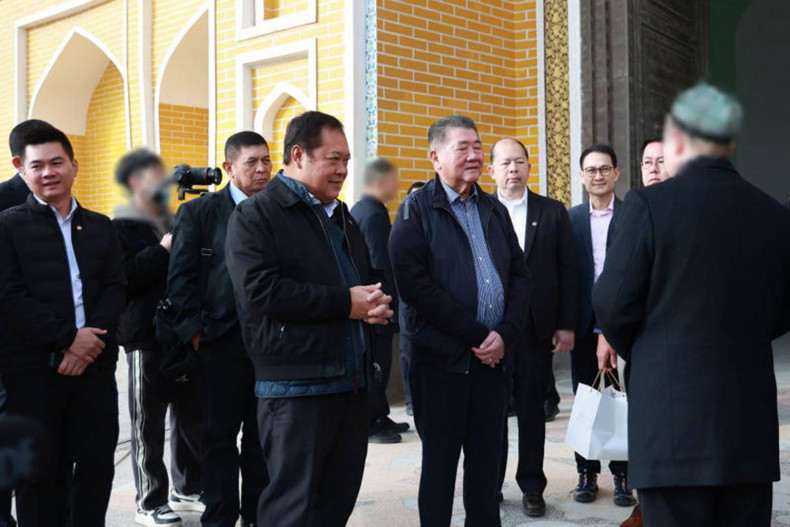Deputy Prime Minister Phumtham Wechayachai and Justice Minister Tawee Sodsong meet with the Imam of the Id Kah Mosque in Kashgar, Xinjiang (East Turkistan), during their visit to follow upon the status of Uyghur returnees on March 20. (Photo: Government House)
by Dilshat Sultan
20 March 2025
Recent visits by Thai officials to Xinjiang region (referred to as East Turkistan by Uyghurs and their advocates) have stirred up international controversy, with contrasting reports on the well-being of deported Uyghurs and the authenticity of the visit itself. Thai Deputy Prime Minister Phumtham Wechayachai and Justice Minister Tawee Sodsong, along with a select group of Thai media, recently concluded a three-day visit to monitor the condition of Uyghur families deported from Thailand. However, skepticism from human rights organizations and journalists' accounts have raised significant doubts about the transparency of the trip.
Thailand’s Official Stance: Voluntary Participation and Human Rights
Phumtham Wechayachai, speaking to Bangkok Post, strongly denied allegations that the Uyghurs’ participation in the visit was staged. He emphasized that the Uyghur families they met were chosen based on their voluntary willingness to engage with the delegation. According to Phumtham, the Thai government respects their rights and had no authority to force any engagement. The primary aim of the visit, he claimed, was to reaffirm Thailand's commitment to human rights and ensure that the deportees were treated according to international standards.
During the visit, Phumtham mentioned that one deportee who had returned to Xinjiang in 2015 shared that he had lived a "normal life" since returning, had married, and even had a child. Phumtham pointed to these experiences as positive examples of the deportees’ integration back into Xinjiang’s society.
China's Foreign Ministry also supported this narrative, reiterating that the deportations were part of “normal law enforcement cooperation” between Thailand and China, with the rights of the Uyghurs being respected in accordance with international law.
Conflicting Reports: Media Control and Allegations of Staged Visits
Despite Thailand’s official position, reports from Radio Free Asia paint a more troubling picture. Journalists who accompanied the Thai delegation reported being under strict surveillance by Chinese officials during the trip. One Thai journalist, Pranot Vilapasuwan from Thairath, revealed that Chinese security personnel closely monitored their activities, even going so far as to demand that photos taken during the visit be vetted and approved before they could be sent back to Thailand. This level of control raised concerns about the authenticity of the visit and whether the Uyghur families were able to speak freely.
Furthermore, critics argue that the visit was designed to deflect international pressure. The deportation of 40 Uyghur men from Thailand to China on February 27, 2025, sparked widespread condemnation from Western governments and human rights groups, who warned that the deportees could face torture and severe repression. The U.S., in response, imposed visa restrictions on unnamed Thai officials involved in the deportations.
Adding to the controversy, it was later revealed that the United States and other countries had offered to provide sanctuary to the Uyghurs, but Thailand proceeded with the deportation under China’s assurances of safety. This further fueled accusations that Thailand prioritized its diplomatic ties with China over the protection of Uyghur rights.
Human Rights Concerns Remain
Human rights organizations, including Human Rights Watch, remain unconvinced by the Thai government’s narrative. They have continuously highlighted the repression faced by Uyghurs in Xinjiang, where over a million Muslims, primarily Uyghurs, are reportedly detained in a network of facilities that are alleged to involve forced labor, political indoctrination, and other forms of abuse.
The controlled environment in which the Thai delegation and journalists were kept, coupled with the tight regulation of media content, suggests that the visit may have been a carefully orchestrated attempt to showcase a sanitized version of Uyghur life in Xinjiang. The stark contrast between official statements and on-the-ground reports leaves the true situation of the deported Uyghurs shrouded in doubt.
Conclusion
While the Thai government maintains that its visit to Xinjiang was a genuine effort to uphold human rights and ensure the well-being of the deported Uyghurs, the heavy media control and international criticism cast significant doubt on these claims. The visit highlights the complex intersection of diplomatic relations, human rights, and media transparency in the ongoing controversy surrounding China’s treatment of Uyghurs in Xinjiang. As the international community continues to scrutinize China’s actions, the fate of the Uyghurs remains a critical issue of global concern.

